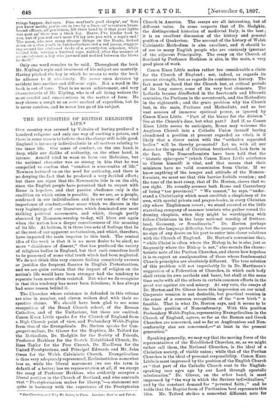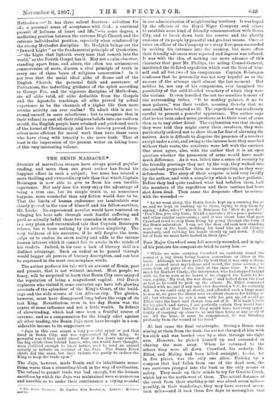THE DIVERSITIES OF BRITISH RELIGIOUS LIFE.*
OUR country was accused by Voltaire of having produced a hundred religions and only one way of cooking a potato, and there is some reason to believe that the charge still holds good. England is intensely individualistic in all matters relating to the inner life. Our sense of conduct, on the one hand, is deep, while our dislike of authority, on the other hand, is intense. Arnold tried to wean us from our Hebraism, but the national character was so strong in him that he was compelled to confess that "conduct is nine-tenths of life." Newman lectured us on the need for authority, and there is no denying the fact that he produced a very decided effect; but there are signs that the Newmanite tide is on the ebb, since the English people have perceived that to coquet with Rome is hopeless, and that passive obedience only is the condition on which union is possible. So we are, as a people, confirmed in our individualism and in our sense of the vital importance of conduct,—that sense which we discern in the very beginnings of our literature, which dominated our most striking political movements, and which, though partly obscured by Mammon-worship to-day, will blaze out again when the nation has a deeper consciousness of the meaning of its life. At bottom, it is these two sets of feelings that lie at the root of our apparent sectarianism, and which, therefore, have imparted the main impetus to this book. The central idea of the work is that it is no mere desire to be aloof, no mere "dissidence of dissent," that has produced the variety of religious bodies in England, but that each conceives itself to be possessed of some vital truth which had been neglected. We do not think this very sincere feeling completely excuses or justifies the frequent fissures in English Protestantism, and we are quite certain that the impact of religion on the , nation's life would have been stronger had the tendency to
separate been more often resisted. But what we do recognise ,
111 that this tendency has never been frivolous; it has always
lad some reason behind it.
The Churches whose existence is defended in this volume are nine in number, and eleven writers deal with their re- spective claims. We should have been glad to see some ;recognition of the Broad Church school, of the Roman Catholics, and of the Unitarians, but these are omitted. Canon Knox Little speaks for the Church of England from a High Church point of view, and Prebendary Webb-Peploe from that of the Evangelicals. Dr. Horton speaks for Con- gregationalism, Dr. Glover for the Baptists, Mr. Telford for the Methodists, Dr. Hodgkin for the Society of Friends, Professor Herkless for the Scotch Established Church, Dr. Roes Taylor for the Free Church, Dr. MacE wan for the United Presbyterians, and Principal Edwards and Mr. John Owen for the Welsh Calvinistic Church. Evangelicalism is thus very adequately represented, Ecclesiasticism somewhat less so, while the liberal movement (we use the term in default of a better) has no representation at all, if we except the essay of Professor Herkless, who evidently occupies a liberal position in the Church of Scotland, and who contends that "Presbyterianism makes for liberty,"—a statement not quite in harmony with the experience of the Presbyterian • Our Churches. and Why Ws Belong to Thent. London: Seneca and Patna. Church in America. The essays are all interesting, but a different value. In some respects that of Dr. Hodgkin, the distinguished historian of medimval Italy, is the beat, it is an excellent discussion of the history and genera) position of Quakerism. The account of the history of Welsh Calvinistic Methodism is also excellent, and it should be of use to many English people who are curiously ignorant of the adjacent Principality. The essay on the Church of Scotland by Professor Herkless is also, in the main, a very good piece of work.
Canon Knox Little makes rather too considerable a claim for the Church of England ; not, indeed, as regards its present strength, but as regards its continuous history. The fact must be faced that the Church lost, at critical periods of its long career, some of its very best elements. The Lollards became disaffected in the fourteenth and fifteenth centuries, the Puritans in the seventeenth, and the Methodists in the eighteenth ; and the grave problem why the Church lost, in the main, Puritans and Methodists, and so lost vast sources of immense spiritual power, is ignored by Canon Knox Little. "Part of the blame for the division" lies at the Church's door, but what part ? And if, as Canon Knox Little seems to anticipate, Rome may welcome the Anglican Church into a Catholic Union (herself having abandoned a position at present regarded as vital), is it likely that a closer union with the "orthodox separated bodies" will be thereby promoted? Let us, with all Our desire for the spread of Christian brotherhood, look facts in the face. The Nonconformists have been told that the historic episcopate" (which Canon Knox Little attributes to Christ himself) is vital, and that means that their ministers have no valid commission from Christ. If we know anything of the temper and attitude of the Noncon- formists, we must see that this barrier forbids reunion ; and the tone of the next essay, that of Dr. Horton, shows that ISE are right. He roundly accuses both Rome and Canterbury of being "too provincial." "We cannot," he says, "under- stand a Christianity which must establish a chaplaincy of its own, with special priests and prayer-books, in every Christian city where Englishmen resort ; we stand amazed at the little starveling company of summer tourists who gather round the droning chaplain, when they might be worshipping with fellow-Christians in the large national worship of Switzer- land, Germany, or Scandinavia." Dr. Horton perhaps forgets the language difficulty, but the passage quoted shows no sign of any desire on his part to enter into closer relations with the Church of England. Dr. Horton's contention that "while Christ is often where the Bishop is, he is also just as frequently where the Bishop is not," also sounds the charac- teristic note of the Puritan Churches, and shows how hopeless it is to expect an amalgamation of those whose fundamental Church principles are absolutely different. The true solution of this problem will not improbably lie in Dr. Martinean'S suggestion of a Federation of Churches, in which each body shall retain its own methods and bases, but shall at the same time unite with all the others in certain common efforts in the great war against sin and misery. At any rate, the essays of Dr. Horton and Dr. Glover leave this impression on our mind. Corporate reunion is not desirable, but practical reunion in the sense of a common recognition of the "new birth" iv feasible. That is what Dr. Horton says, and it seems to be the basic position of Nonconformity. With this position Prebendary Webb-Peploe, representing Evangelicalism in the Church of England, agrees, so far as the Roman and Greek Churches are concerned, and so far as Anglicanism and Non- conformity also are concerned,—" at least in the present generation."
Speaking generally, we may say that the moving force of the representatives of the Established Churches, or, as we might rather call them, the National Churches, is the ideal of a Christian society, of visible union ; while that of the Puritan Churches is the ideal of personal responsibility. Canon }Knox Little is most impressed by the position of the English Church as "that part of the Catholic Church sent to the English- speaking race ages ago by our Lord through apostolic missionaries." Dr. Glover, on the other hand, is most impressed by "the way in which the Saviour individualises," and by the constant demand for "personal faith ; " and he holds that the Baptist form of Puritanism best represents this idea. Mr. Telford strikes a somewhat different note for Methodism :—" It has three salient features : salvation for all ; a personal sense of acceptance with God ; a continual pursuit of holiness of heart and life,"—to some degree, a mediating position between the extreme High Church and the extreme individualist position, especially when reinforced by the strong Methodist discipline. Dr. Hodgkin brings out the "Inward Light" as the fundamental principle of Quakerism, —" the Light that lighteth every man that cometh into the world," as the Fourth Gospel has it. May not a calm observer, standing apart from, and above, the often too acrimonious controversies of sects, discern a vital principle of truth in every one of these bases of religious communion ? Is it not true that the social ideal alike of Rome and of the English Church, the personal faith and assurance of Puritanism, the indwelling guidance of the spirit according to George Fox, and the vigorous discipline of Methodism, are all alike valid, all alike deducible from the Gospels and the Apostolic teachings, all alike proved by actual experience to be the channels of a higher life than mere secular activity can ever realise? To admit this is not to strand oneself in mere eclecticism ; bat to recognise that in their refusal to cast all their religious beliefs into one uniform mould, the English people have retained and quickened much of the kernel of Christianity, and have thereby proved them- selves more efficient for moral work than have those races who have clung with tenacity to the mere husk. That at least is the impression of the present writer on taking leave of this very interesting volume.























































 Previous page
Previous page